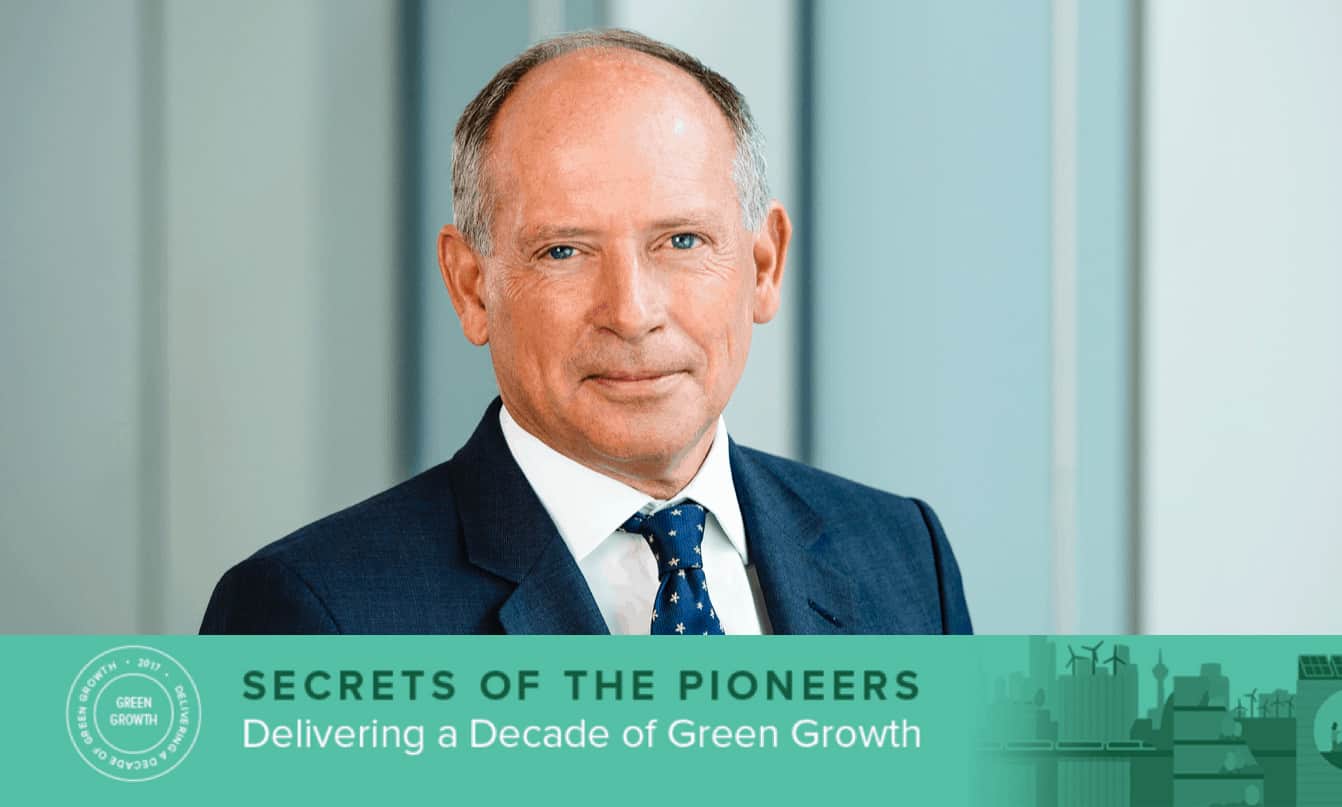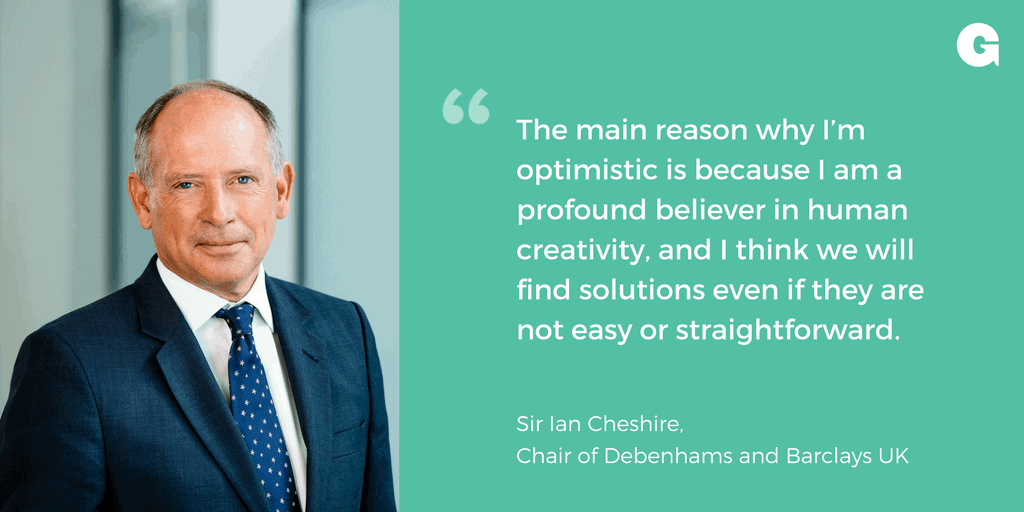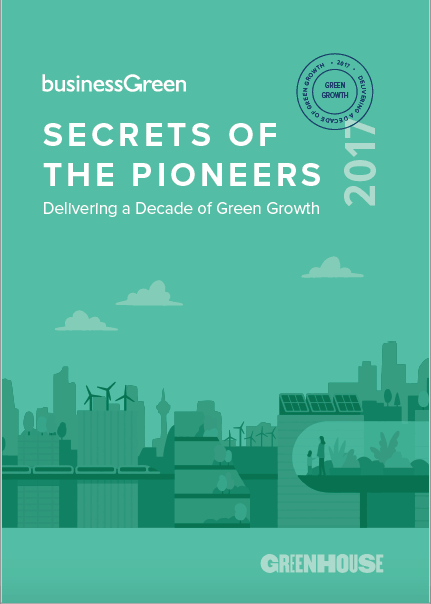Secrets of the Pioneers: Sir Ian Cheshire

We talk to Sir Ian Cheshire, chair of Debenhams and Barclays UK, the retail arm of Barclays bank. The interview is part of a series for a report, Secrets of Pioneers, Delivering a Decade of Green Growth, which will be launched at the BusinessGreen Leaders’ Summit on 9th November 2017.
Sir Ian was previously chief executive of B&Q and then its parent company Kingfisher. He was knighted in the 2014 New Years’ Honours list for services to business, sustainability and the environment.
Where were you in 2007?
I was running B&Q – it was the year before I took over as chief executive of Kingfisher.
We were getting into some of the circular economy work for the first time. There was a sense that summer that the storm clouds of the financial crisis were starting to gather, a feeling things were getting quite uncertain but we needed to move faster on the green agenda.
So what has changed in the last decade, and what have you learned?
I think what has changed most has been the degree of shift in technology in that period.
If you think 2007 was the year the first iPhone was released it doesn’t seem quite possible.
On the back of that the mobile internet has completely transformed the world, and in relation to that (but not directly connected) we have seen an explosion in renewables, new materials and batteries.
I think it’s the rate of change since 2007 which I have most noticed. It’s the hyper-transparency that we have now got, and that you can scale things in a way that wasn’t possible 10 years ago. Change seems to happen at a network rate. So you get these huge shifts – Facebook suddenly connecting billions rather than just a few people.
There’s a sense that if you catch the tide on these things change is possible at a faster rate than ever before. Which is good and scary at the same time.
What is your vision for the green economy in 10 years’ time?
I hope we will have done two big things. One of which is making a more substantial shift towards a circular economy model.
The second part is I think there are real opportunities to rethink how sustainable business can play a role. I think that’s reinforced by this technological change of total transparency, and using that to build a different relationship with customers and citizens. I think that’s a very different model we could be looking forward to.
What would that look like for the average consumer?
I think what you will see emerge is a digitally enabled consumer who is able to understand far more about the impacts of how they behave and what they do, and be able to use that consumer power to help businesses change more.
Fundamentally, the big shift from the consumer’s point of view will be an increasing focus on the sharing or gig economy. We are already seeing it with car ownership in certain groups.

What top three sustainability challenges will top the agenda in 2027?
Personally, I still think we won’t meet the challenge of climate change in the next 10 years. That will still be with us, which is an all-encompassing headline for quite a few other things.
Number two is this model of the economy – can we really see a reinvention of the economy from that linear ‘take, make, dispose’ model to a more circular system?
And then I think you are going to see individual issues arise. It’s interesting that society seems to focus on things for five or 10 years, then declare victory and move on to the next thing. If you think back to the ozone layer, everyone got focused, CFCs got banned and people actually did something about it. I think we are just at the beginning of a 10-year cycle on oceans – not just plastics in our oceans but generally the health of our oceans and the degree to which that has not been understood.
What’s your personal plan for the next 10 years?
One area which interests me is the whole connection between food, farming and the countryside – I’m going to get involved in a project starting later this year on that.
Then the other question, which I still think is not on the agenda enough, is the sustainability of cities. So much of the world’s population is moving to cities and they can be great engines of sustainability if we build them and run them right.
Will the world be on course for two degrees in 2027?
I’m a little pessimistic. I think what we are seeing is the first really big shift in power generation that we have seen certainly in my lifetime. But I think it will require a lot more in the way of things like electric car growth to make it really happen.
But I think what’s most important is the shift in the Chinese leadership, the realisation they simply can’t have unsustainable growth, which makes me more optimistic about the future.
If you could invest in one clean technology through to 2027 which would it be and why?
I’m very interested in the whole area of materials sciences and the ability to make things which could, for example, replace aluminium, things which allow batteries to work on a completely different basis. I think you are going to see some very fundamental changes courtesy of materials science.
What advice would you give to a sustainability professional starting out today?
If you are starting out the two bits of advice I always give to people in an organisation is figure out the unique contribution that organisation can make. Don’t try and do everything. If you are in the car industry, reinvent that one, don’t fret about the other ones.
The second one is think about how to unleash the power of the consumer and the transparent world that we have, and all the data that is out there to make change.
Are you optimistic or pessimistic about the future?
I’m optimistic. The main reason is because I am a profound believer in human creativity, and I think we will find solutions even if they are not easy or straightforward.

The full set of interviews makes up a report, Secrets of the Pioneers: Delivering a Decade of Green Growth, to be published on 9th November, coinciding with the BusinessGreen Leaders’ Summit.
We have previewed several interviews on the Greenhouse PR blog this week. Other featured interviews Christiana Figueres, former executive secretary of the United Nations Convention on Climate Change (UNFCCC), Jonathon Porritt, founder of Forum for the Future, Dr Emily Shuckburgh from British Antarctic Survey and Mike Barry from Marks & Spencer [LINK]. We will continue to post interviews in the coming weeks.
This year marks the 10th anniversary of both BusinessGreen and Greenhouse PR, the specialist communications agency which supports businesses, entrepreneurs and campaigners working to create a green economy.
At Greenhouse, we support a wide variety of organisations pioneering new standards of sustainability across multiple sectors. Whether it’s fashion, finance or farming, we’re always on the look-out for new opportunities to reach our clients’ target audiences. If you’ve got a great story and need our help to tell it, we’d love to hear from you.


